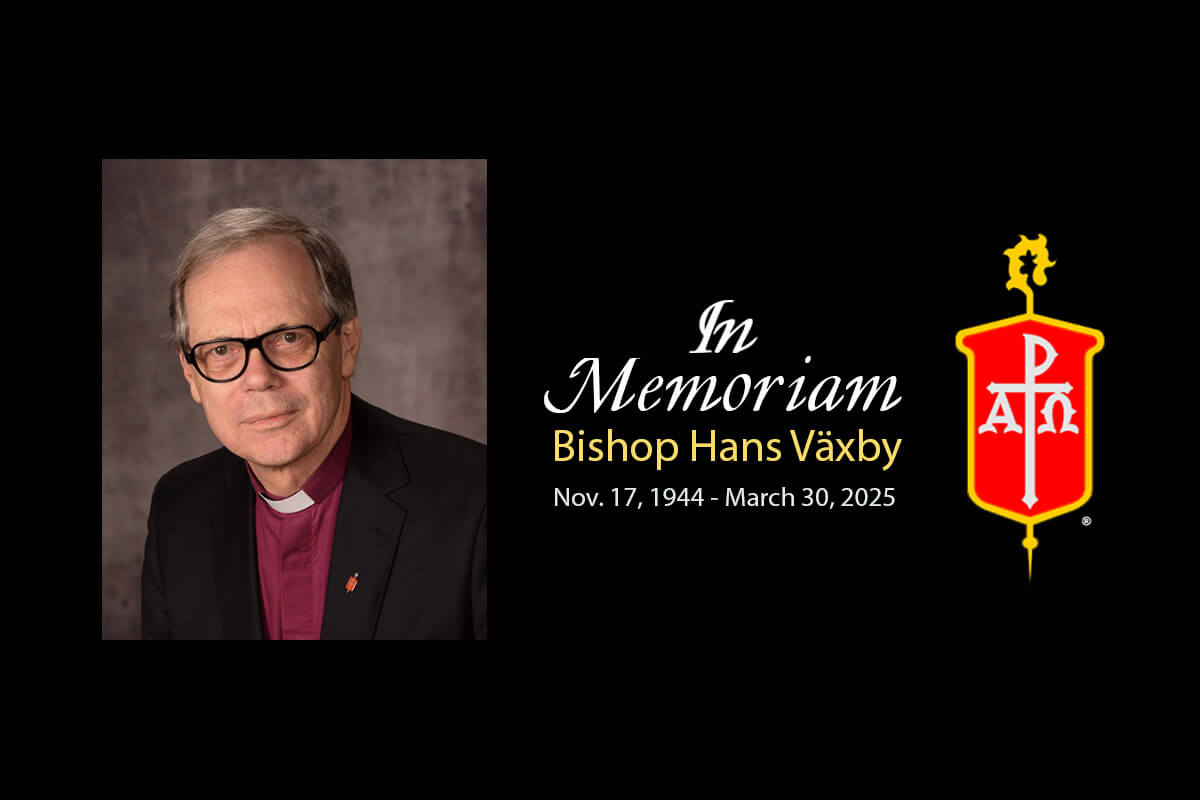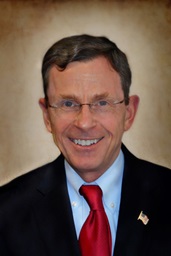Key points:
- United Methodists remember Bishop Hans Växby as a servant leader.
- He helped rebuild the Methodist presence in Latvia, Lithuania, Ukraine and Russia as the Cold War ended and the Soviet Union broke up.
- He led the Nordic and Baltic area from 1989 to 2001 and at Russians’ request, served as the Eurasia bishop from 2005 to 2012.
- He “profoundly impacted the lives of thousands,” said Bishop Christian Alsted.
Bishop Hans Växby believed and taught that with Christ, all things are possible. He demonstrated that faith by revitalizing Methodism in countries behind the Iron Curtain where the church struggled or had been entirely defunct for decades.
Växby served as a United Methodist bishop in Nordic and Baltic countries from 1989 to 2001 and served again as bishop in Eurasia, which encompasses countries that were previously part of the Soviet Union, from 2005 to 2012.
He died on March 30 in Helsinki, at age 80, after a few weeks of illness. His wife, Kaikka, and sons Anssi and Henri were by his side, said Bishop Christian Alsted, who currently leads the Nordic-Baltic-Ukraine Area.
Alsted was a young United Methodist pastor in Denmark when Växby, then a member of the Finland Swedish Provisional Annual Conference, was first elected bishop in April 1989.
“Bishop Hans brought a fresh wind of the Spirit when he became our bishop,” Alsted said.
Växby encouraged and trusted young clergy. “His teaching and preaching, and his presence with us focused us on Christ,” the current bishop said.
“Bishop Hans truly was a servant leader, and he served faithfully all the way until the very last weeks of his life. We are many who will thankfully remember him with great joy and affection.”
Friends and colleagues repeatedly use the words “servant leader” and “humble” to describe Växby.
The Rev. Bill Lovelace, a United Methodist missionary who served previously in Russia and Ukraine, said Växby never wanted to use the title “bishop” and always insisted on simply being called “Hans.”
Lovelace recalled that whenever he needed to attend meetings for the church in Northern Europe, he would stay in a guest room in the bishop’s office in Helsinki. Växby invariably would arrive early at the office and offer to make the missionary breakfast. “He would talk to me for a half hour before the meeting started,” Lovelace said.
The missionary met his Norwegian pastor wife, the Rev. Helen Byholt Lovelace, through those meetings, and the two now serve together in Norway. He also found a lifelong friend and mentor in Växby. The missionary said the bishop had an “outstanding” ability to connect with people of all walks of life.
“At the Finnish Annual Conference, he would go out with youth and young adults to share the faith on the streets,” Lovelace said. “He had this kind of apparatus. It was a tank of coffee on his back and a sack of sweet rolls. So, he’d give out free coffee and rolls and sit down and talk with people.”
The Rev. Øyvind Helliesen, who served as a district superintendent in Norway under Växby, also spoke of how good the bishop was with people.
“He wanted to serve Jesus and the church,” said Helliesen, who is now a member of the Judicial Council, The United Methodist Church’s top court.
By building strong relationships with people, Växby served and led others to do likewise, his friend said.
That approachability served the bishop in good stead when in the waning days of the Cold War, he worked with United Methodists in Estonia to restart the Methodist presence in Latvia and Lithuania.
Both Baltic countries still had a handful of people who had grown up Methodist before Soviet occupation in 1944 shut the church down. But, with the help of interpreters, the bishop — who was fluent in Swedish, Finnish and English — restored the church’s presence as a public ministry.
“Växby helped us to become part of the Methodist family and to learn more about the teachings of the Methodist Church,” said the Rev. Edgars Sneiders, Latvia’s current district superintendent.
“He was a man with an open heart and deep faith. Thanks to him, the Methodist Church in Latvia experienced growth. May the peace and presence of God be with the bishop’s family.”
Lovelace said that with the dissolution of the Soviet Union, Växby extended his revitalization work to Russia and Ukraine. While the Moscow-based Eurasia Episcopal Area still did not exist in the 1990s, Lovelace said Växby essentially provided the first Methodist episcopal oversight in Russia and other parts of the former Soviet Union since the Russian Revolution.
Later, Russian United Methodists asked Växby, then back in pastoral ministry, to run for bishop again so he could serve as their episcopal leader more fully. In 2005, Växby became the second United Methodist bishop to reside in Moscow, following the late Bishop Rüdiger R. Minor.
“Bishop Växby was a humble servant of Christ and an inspirational leader,” said Roland Fernandes, the top executive of the United Methodist Board of Global Ministries. “A man of great integrity, his deep passion for mission and commitment to revitalizing the church in Latvia, Lithuania and Russia has left a lasting impact on the lives of many.”
The Rev. Adam Hamilton, senior pastor of Resurrection, a United Methodist Church in Leawood, Kansas, worked closely with Växby in providing leadership training in Russia and Ukraine.
Like so many, Hamilton noted that the bishop was a humble and devoted follower of Christ. “He was also a brilliant leader who cared deeply about the flock entrusted to his care.”
Växby was born in Nässjö, Sweden, and planned to become a clergy member in what was then the Sweden Annual Conference. However, he met and fell in love with the Rev. Kaija-Rooka, a Helsinki native.
The two moved to Finland after their marriage in 1968. He was ordained an elder in the Finland Swedish Provisional Annual Conference, which serves Swedish-speaking United Methodists in Finland. Before his first election as bishop, Växby was pastor of churches in Jakobstad and Borgå.
He served 12 years in the Nordic and Baltic Area, the maximum allowed under the term rules of what was then the Northern Europe Central Conference.
Subscribe to our
e-newsletter
The Rev. Hilde Marie Øgreid Movafagh was 14 when Växby was first elected in 1989. She is now rector, the equivalent of dean, at the United Methodist seminary in Oslo, Norway, as well as a member of the United Methodist Committee on Faith and Order. As a theology student, she said she could count on Växby’s support.
“I was young and thought I had the answers, and he still listened, not only patiently,” she said, but also with interest.
“He was the bishop who could calm down the temperature and make sure those who fell out of the debate were listened to,” she said. “Well, one of the consequences of his patience was that we had night sessions at the annual conference quite often — because patience takes time.”
She added that the Nordic-Baltic Area gave Eurasia a wise bishop, who did excellent work until Eurasian United Methodists were ready to elect a Russian leader as their bishop.
Bishop Eduard Khegay, born in Kazakhstan, served as Växby’s assistant before Khegay’s own election as Eurasia’s first native-born episcopal leader in 2012.
“His dedication and spiritual disciplines inspired us — he regularly studied the Bible, prayed for us, preached the Gospel, lovingly sang Christian hymns and published articles on what it means to be a disciple of Christ,” Khegay said in a Facebook post remembering his mentor.
On April 2, the four annual conferences in Russia, Belarus, Kyrgyzstan and Kazakhstan completed the process of leaving The United Methodist Church to form an autonomous Methodist denomination.
The church in Ukraine and Moldova remains part of The United Methodist Church.
Lovelace, the missionary, said Växby was sorry to see the churches in Eurasia as well as Estonia leave, but he understood the need given the churches’ respective circumstances.
Khegay wrote that he was grateful to be able to talk to Växby in the week before his death. “I had the opportunity to tell him how much I love him and how much we in Eurasia love and miss him,” said Khegay, who is joining his area in forming an autonomous church.
Lovelace said the bishop would continue to coach and support clergy long after he retired. When Lovelace served as district superintendent in Lithuania from 2010 to 2017, he knew he could turn to Växby for advice. Växby and his wife also remained active members of Christ Church United Methodist Church in Helsinki.
“With over 55 years of service as a pastor and bishop, Hans Växby profoundly impacted the lives of thousands,” said Alsted, who will soon retire himself as bishop of the Nordic-Baltic-Ukraine Area,
In addition to his wife and two sons, Växby is also survived by four grandchildren.
The funeral for Växby is scheduled for 1 p.m. Eastern European time April 26 at Christ Church United Methodist Church.
Hahn is assistant news editor for UM News. Contact her at (615) 742-5470 or [email protected]. To read more United Methodist news,subscribe to the free UM News Digest.




